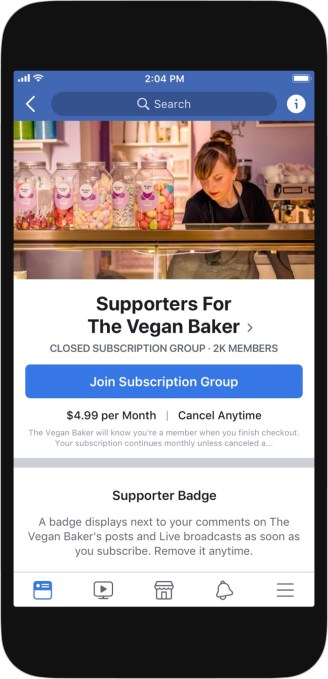Facebook will take a cut of up to 30% on fan subscriptions, beginning on January 1, 2020.
The social network is revealing its plans as part of a broader slate of monetization-related announcements this week at VidCon. The news confirms a TechCrunch report earlier this year that Facebook would be taking a 30% share of subscription revenue.
Facebook first started rolling out fan subscriptions in early 2018, allowing creators to charge their fans $4.99 per month in exchange for access to exclusive content and a fan badge. During this initial testing period, Facebook didn’t keep any of the subscription revenue for itself, allowing creators to take everything, minus the fee collected by Apple and Google on mobile subscriptions.
Director of Media Monetization Kate Orseth told journalists at a briefing last week that Facebook is committed to allowing creators to keep 70% of subscription revenue (minus “applicable taxes and fees”). So when the mobile platforms collect their 30% fee on first-year subscriptions, Facebook won’t take a cut. Then, as the platforms lower their share to 15% in the second year, Facebook will take the other 15%.
Again, that’s all on mobile, which Orseth said represents the majority of subscriptions thus far. On desktop, Facebook will be able to take the full 30% from the start. (This compares to a 5% subscription fee collected by Patreon, a 30% fee collected by YouTube and a 50% fee collected by Twitch.) And Orseth noted that all of this only applies to new subscribers starting in January — Facebook won’t be taking a revenue share on subscribers who signed up before then.

In addition, Facebook says it’s allowing creators to launch exclusive groups for subscribers. And it’s expanding the Facebook Stars program, the virtual currency that allows users to tip game streamers — it’s now testing the feature with non-gaming video creators. The company says creators should earn 1 cent for each Star a fan sends to them. And yes, Facebook is also taking a cut here, though it says its share decreases as fans buy larger packs of Stars.
Facebook is also making a number of ad-related announcements. Among them: creators will be able to limit ads on a video to “non-interruptive” formats like pre-roll and image ads, so there are no ad breaks inserted. In addition, they’ll be able to share their audiences with advertisers in the Brand Collabs Manager for ad targeting. And they can start viewing their Instagram data in Facebook’s Creator Studio.
Orseth said the company’s goal is “to create suite of monetization products that can be used individually” or in a bundle. She suggested that while ad breaks work best for creators with a broad audience, subscriptions are better for those with a “hyperloyal audience” and brand collaborations “work well across the board.”
As part of the briefing, Orseth introduced journalists to Mark Ian Hoyle and Roxanne Hoyle, the parents behind the popular LadBaby Facebook Page, where they share videos of their family and children. The Hoyles said that by using the full suite of Facebook monetization tools, they’ve been able to focus on making videos (Mark still works as a freelance graphic designer as well), and to afford trips to make more videos.
Given the broader controversies over who gets to make money on major online platforms, Orseth and the Facebook team were also asked about eligibility for monetization. The company says that each product has its own eligibility requirements, and that for now, humans are reviewing each application to participate in the Brand Collabs Manager and Fan Subscriptions.

